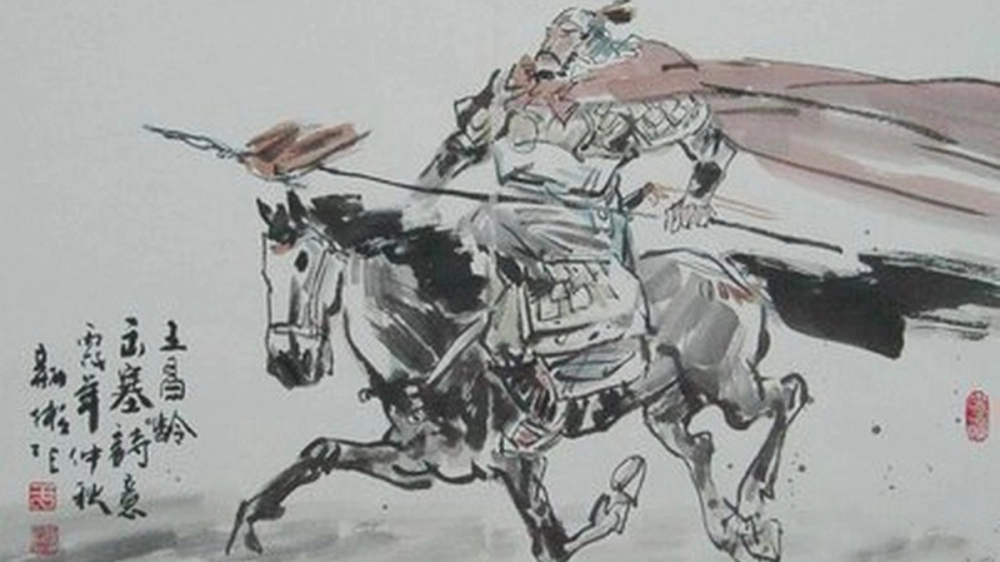English, French and Chinese translation of Wang Changling’s poem
On the frontier, a cavalryman pauses at a river crossing to allow his horse to drink. In the dark, dark distance lies the Great Wall at Lintao. It is autumn and already cold. The wind cuts like a sword. The setting sun is not yet gone. The cavalryman’s thoughts return to battles long ago.

王 昌 齡 Wang Changling
A Song at the Pass (Under a Border-fortress)
A song at the pass
Drink deep, my horse, it is autumn as we cross the river
The river is cold, and the wind cuts like a sword
Across the sandy plain, the sun flickers
Far, far faraway lies Lintao
Where at the Great Wall, we once battled day long
With salty high spirits, and hoarse voices
The past and the present are the same Yellow Earth
Bleached bones scattered in bitter sagebrush
Une chanson au passage
Buvez bien, mon cheval, c’est l’automne et nous traversons la rivière,
La rivière c’est froid, le vent coupe comme un couteau
Le sable est de niveau, le soleil était encore dans le ciel
Loin, loin, Lintao est lointain
Où nous nous sommes battus journée sous la Grande Muraille
Esprits élevé bien qu’il parlait sourdement
Ce qui était alors il est poussière jaune
Os blanchis perturbés dans l’armoise amère

塞下曲
飲馬渡秋水
水寒風似刀
平沙日未沒
黯黯見臨洮
昔日長城戰
咸言意氣高
黃塵足今古
白骨亂蓬蒿
Discussion of Wang Changling’s poem
Tang cavalry defeated the Gok Turks in 639, helping the empire to secure peace along the Silk Road, but later battled Tibetan and Mongol armies for control. Perhaps it is this first battle that is recalled and the later battles to be fought that await.
The usual title is Under a Border Fortress, but this seems inaccurate. The Chinese characters 塞 translates stopped or plugged,下 translate as beneath, and the last character 曲 as either song or wrong. The play on characters, Wang’s amusing political commentary.
The soldier and his horse are at a river crossing that serves as the frontier border. He stops to allow his horse to drink. The sun has not yet set, 日未, (third line) and so we know the day’s journey is not over. The cold autumn wind cuts like a sword 刀.
The fourth line begins with the repetition of the Chinese characters 黯黯, literally dark, dark.
Such a lovely choice of characters, like Robert Frost’s “dark and deep” these words work at several levels. The day is not yet dark. What is dark is hidden. Dark are our memories of long ago. Dark and light are the yin and yang of Chinese poetry.
These characters are usually translated as “far, far” implying distance, but that fails greatly.
The adjective is paired with the noun 見, which is the Chinese character for opinion or view. Used as a verb it means to see.
The only specific place-name is Lintao, a far western province at the edge of the Tibetan Plateau along the Silk Route. Tibetan conflicts occurred early in the Tang dynasty and the conflicts favored the Chinese. However, in 763 AD, the Tibetans captured the Chinese capital city of Chang’an during the midst of the Anshi Rebellion.
The fifth line speaks of the battles beneath the Great Wall, 長城 (Changcheng), literally long walls. The Tang Dynasty did not resort to extending the walls already built, but to warfare as a means of protecting the empire. There were battles far to the west at Lintao with the Tibetan empire and with the Mongols to the north in the Yin Mountains. The poet gives the specific place name of Lintao, but does not name his present location.

Sixth line. Then the soldier’s salty spirits were high.
Seventh line. 黃塵, Yellow Dust, a metaphor for earth.The drying bleached bones of dead soldiers make up the Yellow Earth. The sagebrush that grow there is bitter and so is the memory. The character 蒿 is wormwood. It may also be a reference to Chrysanthemum tea, which is an herbal remedy for a sore throat. Some translators substitute the less hardy herb “basil,” a thickener for soup, which is another good metaphor.
An allusion to the Yellow River, the mother river of China, which produced huge amounts of “yellow” loess sediment.
Or, the Yellow Dust, also called Asian Dust, a sulfuric mixture that rises from the Mongolian and Tibetan plains and falls on China.
The poet Wang Chengling leaves us with many unanswered questions. Who is the warrior poet who composes these words at the river. Where is he headed? Is he one of many or alone?
Is Tang poetry relevant today?
Listen to the lyrics of two very different pop culture songs, A Horse with No Name by America, or Leon Russell’s This Song is for You, and draw your own conclusions.
A man and a horse, crossing the desert or a river, memories, and a song for you, all universal motifs. We are not so distant in time and culture that the far, far hills of Lintao can’t be summoned quickly to mind.












